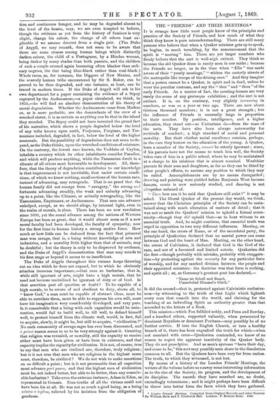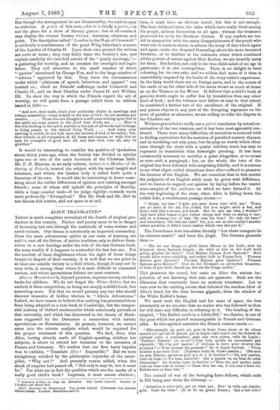THE " FRIENDS " AND THEIR MEETINGS.* IT is strange
how little most people know of the principles and practice of the Society of Friends, and how much of what they think they know is pure misunderstanding. There are still many persons who believe that when a Quaker minister gets up to speak, he begins, in much trembling, by the announcement that the spirit is " moving " him. There are yet larger numbers who firmly believe that the sect is well-nigh extinct. They think so because the old Quaker dress is rarely seen in our midst ; because the Friends no longer, as in the time when " Elia " was made aware of their "yearly meetings," "whiten the easterly streets of the metropolis like troops of the shining ones." And they imagine that a person cannot be a Quaker, in spirit and in deed, unless he wear the peculiar costume, and say the " thee " and "thou "of the early Friends. As a matter of fact, the meeting-houses are very rarely the scene of any grotesque exhibition ; and the sect is not extinct. It is, on the contrary, very slightly increasing in numbers, or was so a year or two ago. There are now about thirteen thousand members ; it is not a great strength ; but the influence of Friends is unusually large in proportion to their number. By position, intelligence, and a higher education, they stand out—as Unitarians do—from the mass of the sects. They have also been always noteworthy for rectitude of conduct ; a high standard of social and personal morality. But their chiefest social excellence consists, perhaps, in the care they bestow on the education of the young. A Quaker, born a member of the Society, cannot be utterly ignorant ; since, if his parents have not the means to teach him well, the Society takes care of him in a public school, where he may be maintained at a charge to his relatives that is almost nominal. Wealthier parents fit their sons and daughters, as far as they can be fitted by other people's efforts, to assume any position to which they may be called. Accomplishments are by no means disregarded ; drawing and painting were yielded before Benjamin West became famous, music is now seriously studied, and dancing is not altogether unheard of.
"'Then how can it be said that Quakers still exist ?" it may be asked. The liberal Quaker of the present day would, we think, answer that the Christian principles of the Society can be main- tained along with much alteration of matters of detail ; that it was not so much the Quakers' mission to uphold a formal eccen- tricity—though they did uphold that—as to bear witness to an essential truth. And, he might continue, that essential truth was urged in opposition to two very different influences. Meeting, on the one hand, the errors of Rome, or of the sacerdotal party, the principle of Quakerism declared that no mortal power can come between God and the heart of Man. Meeting, on the other hand, the errors of Calvinism, it declared that God is the God of the race, and not of a favoured and limited coterie. Quakerism did the first—though probably with mistake, probably with exaggera- tion—by protesting against the necessity for any particular form of worship, and for any marked division between the people and their appointed ministers : the doctrine was that form is nothing, and spirit all ; or, as Germany's greatest poet has declared,— " Name 1st Schell mad Ranch,
Umnebelnd Himmel's Gluth."
It did the second—that is, protested against Calvinistic exclusive- ness—by witnessing to the truth of that Light which lighteth every man that cometh into the world, and claiming for the teaching of an indwelling Spirit an authority greater than that accorded to the letters of a Book.
This mission—which Fox fulfilled nobly, and Penn and Barclay, and a hundred others, supported valiantly, when persecuted by dominant Royalists or dominant Puritans—may possibly be of no further service. If into the English Church, or into a healthy branch of it, there has been engrafted the truth for which—when not unmixed with error—Quakerism contended, we know of no reason to regret the apparent inactivity of the Quaker body. They do not proselytize. And as men's systems "have their day, and cease to be," this sect may possibly soon share in the dissolution common to all. But the Quakers have been very far from useless. The truth, to which they witnessed, is not lost.
By means of a history of the London Friends' Meetings, the writers of the volume before us convey some interesting information as to the rise of the Society, its progress, and the development of its discipline. The records they have searched are, no doubt, exceedingly voluminous ; and it might perhaps have been difficult to throw into better form the facts which they have gathered.
London Friends' Meetings. Compiled from Original Records and other Sources By William Beck and T. Frederick Ball. London : F. Bowyer Kitto. 1869.
But though the arrangement be not blameworthy, the style is open to criticism. A précis of this sort,—for it is chiefly a précis, —is not the place for a show of literary graces ; but at all events it may display the sterner literary virtues : terseness, clearness, and point. The description called "London in the Days of Cromwell" is evidently a reminiscence of the great Whig historian's account of the London of Charles II. Upon their own ground the writers are more at home ; they very fairly trace the Society's rise, and explain carefully the two-fold nature of the "yearly meetings,"— a gathering for worship, and an occasion for oversight and legis- lation. They call attention to the small number of direct "queries" sanctioned by George Fox, and to the large number of " advices " approved by him. They trace the circumstances under which "plainness of speech, behaviour, and apparel" was insisted on ; dwell on Friends' sufferings under Cromwell and Charles II., and on their liberties under James II. and William III. To show the way in which the Friends regard the act of worship, we will quote from a passage culled from an address issued in 1660 :—
" And now, dear souls, mind your particular duties in meetings and solemn assemblies come orderly in the fear of God: be not careless, nor
wander Those who are brought to a still pure waiting upon God in the spirit are come nearer to the Lord than words are Here is
the true feeding in the spirit, and this is the end of all words and writings, to bring people to the eternal living Word. . . . And when your meeting is ended, do not look upon the service of God to be ended ; but, dear friends, in all companies, at all times and seasons, so walk that ye may be examples of good unto all, and that God, over all, may be glorified."
It would be interesting to consider the position of Quakerism about thirty years ago, when the Society was divided in opinion upon one or two of the main doctrines of the Christian faith. Mr. F. D. Maurice, in an early volume, Letters to a Member of the Society of Friends, treated the subject with his usual insight and tolerance, and within the Quaker body it called forth quite a literature of its own. It would also be interesting to know some- thing about the milder differences of opinion now existing amongst friends ; some of whom still uphold the principles of Barclay, while a large number tend—if we judge rightly—towards views more professedly "Evangelical." But Mr. Beck and Mr. Ball do not discuss this matter, and our space is at end.































 Previous page
Previous page